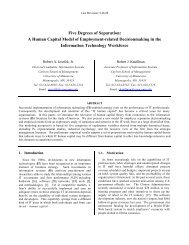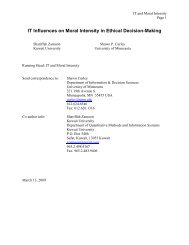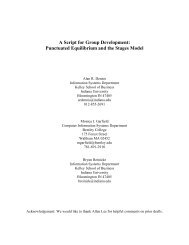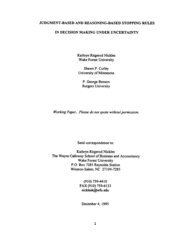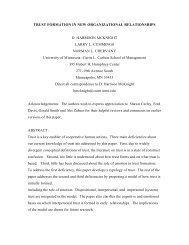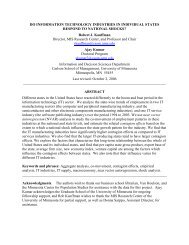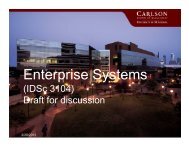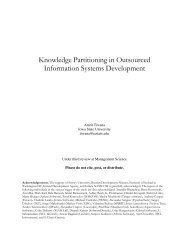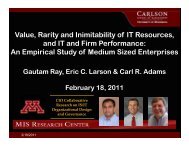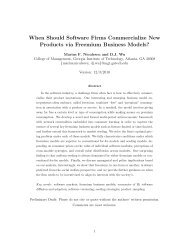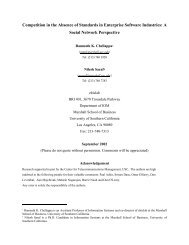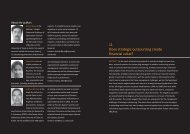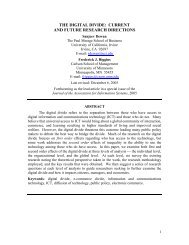Agent-Based Modeling to Inform Online Community Theory and ...
Agent-Based Modeling to Inform Online Community Theory and ...
Agent-Based Modeling to Inform Online Community Theory and ...
You also want an ePaper? Increase the reach of your titles
YUMPU automatically turns print PDFs into web optimized ePapers that Google loves.
Kollock, P. 1999. The economies of online cooperation: Gifts <strong>and</strong> public goods in cyberspace. In Smith,<br />
M.A., & Kollock, P., eds. Communities in Cyberspace. Routledge, London.<br />
Konstan, J., Miller, B., Maltz, D., Herblocker, J., Gordon, L., & Riedl, J. (1997). GroupLens: applying<br />
collaborative filtering <strong>to</strong> Usenet news. Communications of the ACM, 40(3), 77 - 87<br />
Kraut, R. E., Wang, X., Butler, B., Joyce, E., & Burke, M. 2007. Building commitment <strong>and</strong> contribution<br />
in online groups through interaction. Working Paper. Carnegie Mellon University.<br />
Lampe, C., & Johns<strong>to</strong>n, E. 2005. Follow the (slash) dot: Effects of feedback on new members in an online<br />
community. ACM Conference on Supporting Group Work. ACM Press. 11-20.<br />
Liang, T.-P., Lai, H.-J., & Ku, Y.-C. 2007. Personalized content recommendation <strong>and</strong> user satisfaction:<br />
Theoretical synthesis <strong>and</strong> empirical findings. Journal of Management <strong>Inform</strong>ation Systems, 23(3), 45-<br />
70.<br />
Ling, K., Beenen, G., Ludford, P.J., Wang, X., Chang, K., Li, X., Cosley, D., Frankowski, D., Terveen, L.,<br />
Rashid, A.M., Resnick, P., & Kraut, R.E. 2005. Using social psychology <strong>to</strong> motivate contributions <strong>to</strong><br />
online communities. Journal of Computer Mediated Communication, 10(4), article 10.<br />
McKenna, K.Y.A., Green, A.S., & Gleason, M.E.J. 2002. Relationship formation on the Internet: What's<br />
the big attraction? Journal of Social Issues, 58(1), 9-31.<br />
Ma, M., & Agarwal, R. 2007. Through a glass darkly: <strong>Inform</strong>ation technology design, identity verification,<br />
<strong>and</strong> knowledge contribution in online communities. <strong>Inform</strong>ation Systems Research, 18(1), 42.<br />
North, M.J., & Macal, C.M. 2007. Managing business complexity: Discovering strategic solutions with<br />
agent-based modeling <strong>and</strong> simulation. Oxford University Press, London.<br />
Pew Internet. 2001. <strong>Online</strong> communities: Networks that nurture long-distance relationships <strong>and</strong> local ties.<br />
http://www.pewinternet.org/PPF/r/47/report_display.asp, accessed on May 1, 2007.<br />
Postmes, T., & Spears, R. 2000. Refining the cognitive redefinition of the group: Deindividuation effects<br />
in common bond vs. common identity groups. In Postmes, T., Spears, R., Lea, M., Reicher, S., eds.<br />
SIDE effects centre stage: Recent developments in studies of de-individuation in groups. KNAW,<br />
Amsterdam, the Netherl<strong>and</strong>s 63-78.<br />
Preece, J. 2000. <strong>Online</strong> communities: Designing usability, xupporting xociability. Wiley, Chichester, Engl<strong>and</strong>.<br />
Preece, J., Nonnecke, B., & Andrews, D. 2004. The <strong>to</strong>p 5 reasons for lurking: Improving community experiences<br />
for everyone. Computers in Human Behavior, 20(2), 201-223.<br />
Prentice, D.A., Miller, D.T., & Lightdale, J.R. 1994. Asymmetries in attachments <strong>to</strong> groups <strong>and</strong> <strong>to</strong> their<br />
members: Distinguishing between common-identity <strong>and</strong> common-bond groups. Personality & Social<br />
Psychology Bulletin, 20(5), 484-493.<br />
36



